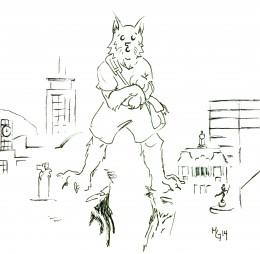
Moving from campus to Downtown is a lot like entering purgatory. Off-campus students no longer enjoy the perks of easy access to food, free laundry and health services within walking distance. But, living in a luxury apartment or a dilapidated house with 10 of your closest friends is far from an accurate indicator of what post-college adulthood is like. In this quasi-real world, students often find themselves with unique concerns that do not fit squarely within the jurisdiction of campus or the city of Binghamton. As more students move Downtown, it’s imperative to reconcile these two worlds by developing new ways to serve off-campus students.
The University’s recently launched pilot program, Binghamton Police Partnership, expresses an effort to attend to the needs of these students. Under this program, the University will pay the salary of a city of Binghamton police officer working out of the University Downtown Center. Intended to serve as a liaison between the city of Binghamton, the University and its students, the appointed officer’s purpose is to provide Downtown students with the attention their particular needs require. As such, his duties include holding regular office hours and patrolling State Street during weekend nights.
This officer stands in a privileged position in relation to University students, upholding both the directive of the University Police Department and of the Binghamton Police Department. While UPD officers often describe themselves as part of the educational apparatus, seeking to help students rather than incriminate them, Binghamton police officers are sworn to protect the residents of the city. An individual beholden to both goals can give students better-informed advice and would presumably be easier to approach at his UDC office than would be the officers operating out of the intimidating Downtown police station.
Beneficial as this may seem, the Binghamton Police Partnership should only be the beginning. It should be a starting point for a more comprehensive effort to address the concerns of Downtown students. The goal, however, should not be a replication of campus experience: Students move Downtown for a reason. They want to enjoy the freedom of living without supervision. For many students, this is the first time they’re living on their own, and are thus more susceptible to fall prey to those wishing to exploit their naïveté.
We all have a friend who has had to deal with an absentee landlord, unwilling to follow through on repairs or return security deposits. The University offers a free legal clinic for all off-campus students, but the clinic meets only three times a month. If the University is willing to hire a police liaison, they also ought to install a legal advisor available to meet with off-campus students more regularly.
Beyond safety and legal dilemmas, students encounter a number of challenges living off campus, and many of these issues could be easily addressed. Signs for Off Campus College Transport (OCCT) bus stops would help off-campus students get to class on time with less stress. A weekend shuttle to bring Downtown students to grocery stores would take some of the pressure off adults cooking for themselves for the first time. Even a better bike route or bike lanes on city streets would give off-campus students an alternative mode of transportation in fair weather.
The first step the University can take to account for students migrating Downtown is to speak to individual students and gauge their suggestions for the future. The Off Campus College Council (OC3) was developed to represent the interests of off-campus students, but the University should seek students beyond OC3 to gain a complete understanding. We are an incoherent group, and it’s difficult to categorize us like ResLife communities. A student living in University Plaza may have very different suggestions for improvement than a student living on Walnut Street.
Half the BU student population lives off campus. It’s about time our needs were addressed, and we believe the Binghamton Police Partnership is a promising first step.


